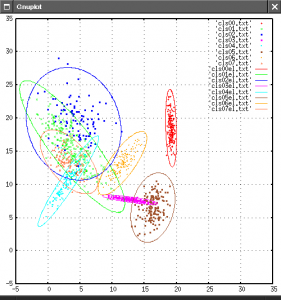Clustering procedures are designed to group objects in accordance with their similarity. Historically, the first methods of clustering are hard partitioning since an object is strictly classified into a group. Thereby, the boundaries among classes are sharply in such partition. However, in practice, the characteristics of most objects are usually subject to some uncertainty. The work of Zadeh provides a way to soft partitioning based on fuzzy sets theory, that is, the fuzzy cluster analysis. By fuzzy clustering the degree of uncertainty of objects belonging to each group is obtained. Thus, the real properties of the objects can be more accurately reflected. For the last years, fuzzy clustering has been a fruitful field of research.
Areas of application of fuzzy cluster analysis include for example data analysis, pattern recognition, and image segmentation. The detection of special geometrical shapes like circles and ellipses can be achieved by so-called shell clustering algorithms. Fuzzy clustering belongs to the group of soft computing techniques (which include neural nets, fuzzy systems, and genetic algorithms)
Some previous group results
Javier Palarea-Albaladejo, Josep Antoni Martín-Fernández, Jesús A. Soto. Dealing with Distances and Transformations for Fuzzy C-Means Clustering of Compositional Data, Journal of Classification. Volume 29, Issue 2, pp 144-169. July 2012.
Jesús Soto, Antonio Flores-Sintas, Javier Palarea. Improving Probabilities in a Fuzzy Clustering Partition. Fuzzy Sets and Systems 159 (2008) 406 – 421.ISSN: 0165-0114
Jesús Soto, M. Isabel Vigo Aguiar, Antonio Flores-Sintas. Afuzzy clustering application to precise orbit determination. Journal of Computational and Applied Mathematics 204 (2007) 137-143. ISBN/ISSN: 0377-0427
Jesús Soto, Antonio Flores-Sintas, M. Isabel Vigo Aguiar. Marco formal para una nueva función objetivo en agrupación difusa. Inteligencia Artificial, Revista Iberoamericana de I.A. 23 (2004) 35-42. ISBN/ISSN: 1137-3601
